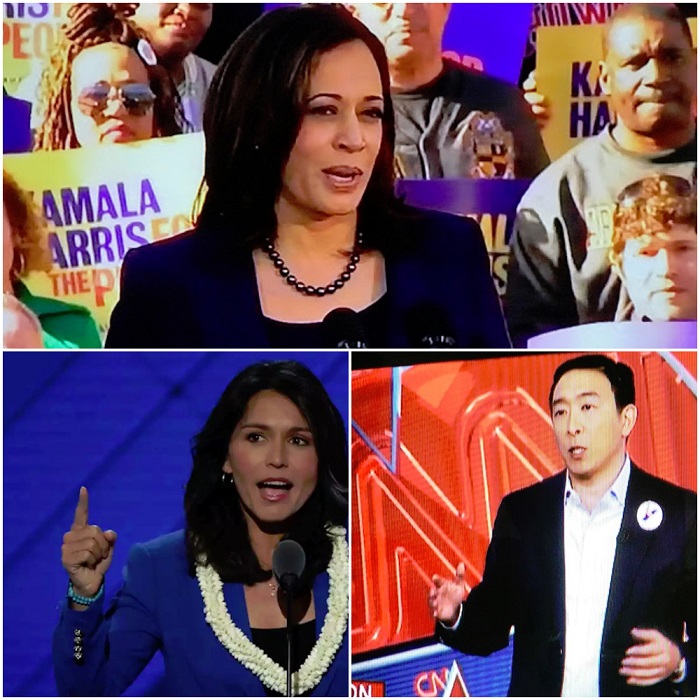
By Ann Thuy Nguyen
With three Asian American and Pacific Islander candidates running for the Democratic presidential ticket, AAPI voters have an opportunity to find a presidential candidate, who looks like them and reflects their ethnic and racial heritage — but that doesn’t mean those candidates will earn their votes, according to the non-partisan APIA Vote, a non-profit dedicated to encouraging political engagement in the Asian American and Pacific Islander communities.
Analysts say it takes more than racial representation for AAPI candidates to win over the fastest growing ethnic U.S. population, projected to reach 12.2 million new eligible voters by 2040. Despite being one of the most diverse primary fields in America’s 243-year-old history, Vox recently reported that young voters of color, including Asians, are more likely to vote for two White men, Democratic candidates Joe Biden and Bernie Sanders.
James S. Lai, who is an associate professor of ethnic studies at Santa Clara University and research fellow at Asian Pacific Islander Vote (APIAVote), said to AsAmNews that AAPI candidates at all levels see the most success when they consider suburbs as “political incubators” and local level positions as the building block to harness political power.
Two of the AAPI candidates have had history working at the local level. Rep Tulsi Gabbard (D-HI) served as Honolulu City councilperson and Sen. Kamala Harris (D-CA) as Alameda County’s deputy district attorney before making their way to congressional positions. Other non-AAPI candidates like former VP Joe Biden and Senator Bernie Sanders (D-VT) have also previously held positions in suburban city councils.
“A majority of AAPI have to build up because it’s very difficult to get those endorsements and the money if you don’t have the kind of connections,” said Lai to AsAmNews. “You just cant assume that people are going to line up just because you declared for a seat.
Lai points to U.S. Representative Judy Chu (D-CA-27) as a primary example of an AAPI elected state official who later gained political prominence by initially establishing political roots at the local level in suburbs.
“She started her career on the Monterey Park school board, then eventually got elected to city council, and then to state assembly from a district that included Monterey Park,” said Lai. “These suburbs are political incubators for future candidates not just at local level, but for those who get elected at the local level to parlay that into what I call vertical political incorporation.”
On the other hand, Andrew Yang, the third AAPI Democratic candidate, has never held an elected position.
Despite his lack of political experience, Yang’s diverse coalition of supporters might explain why he polls ahead of two established Democrats — Sen. Kirsten Gillibrand and Rep. Amy Klobuchar, according to POLITICO/Morning Consult polls. It’s unknown how much gender plays a factor in Yang’s likeability, but he received strong reactions from different communities. He impressed Breakfast Club’s Charlamagne tha God, a Black radio and TV host, and Fox News Tucker Carlson, a conservative political commentator. Yang has also raised the fifth most amount of money from Asian voters, and also garnered support from White nationalists that he later disavowed.
While the AAPI voting bloc is becoming more Democratic, and seeing greater numbers due to growing naturalization and young AAPI becoming of age to vote, they have yet to dictate the results of the presidential election or primaries. Both Lai and Christine Chen, executive director of APIAVote, talked about the importance of forming pan-ethnic and multiracial networks.
“Most Asian American candidates are running in locations where you have to build a multiracial coalition base of voters to win,” Chen said to AsAmNews. “If you’re going to run as the presidential nominee, you’re going to need to get a broad base of support.”
However, she acknowledges the positive of AAPI candidates, who engage both AAPI and non-AAPI groups.
“The beauty is that being an Asian American the hope is that [candidates] will engage this population,” said Chen. “In 2020, we’re presented with a unique opportunity, not only just AAPIs but also the general American public, that there are opportunities for continued emphasis on civic participation.”
AsAmNews has Asian America in its heart. We’re an all-volunteer effort of dedicated staff and interns. Check out our Twitter feed and Facebook page for more content. Please consider interning, joining our staff or submitting a story.

